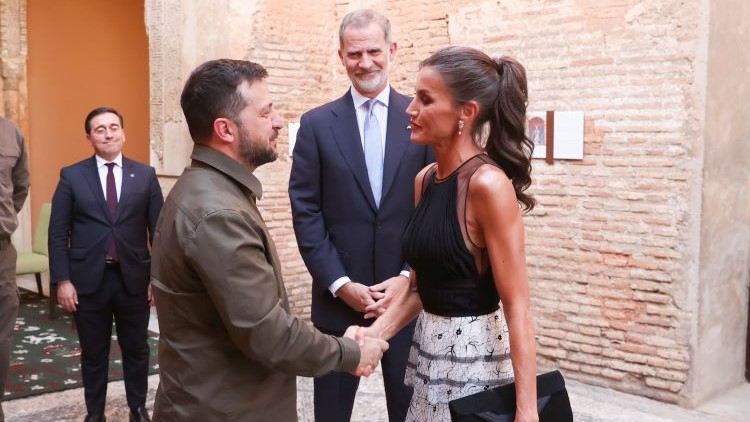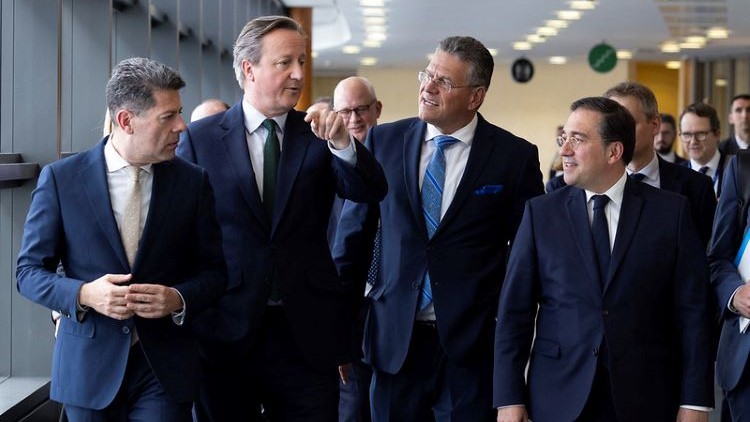Eduardo González
The President of Ukraine, Volodymir Zelenski, has cancelled the visit he was going to make to Madrid next Friday, according to sources at the King’s Household, after announcing today that he was going to meet Felipe VI and then have lunch at the Royal Palace.
Zelensky announced his travel to Spain this Friday, where he was to sign a bilateral security agreement with the President of the Government, Pedro Sánchez, and was to be received at the Royal Palace by King Felipe VI.
The agreement to be signed with Sánchez is similar to that signed with other countries, such as the United Kingdom, Germany, France, Italy, Denmark or Canada, to guarantee sustained military support (delivery of weapons and training of troops) in the long term pending their accession to NATO or the European Union.
The agenda of the Royal House reported yesterday included that the King “will hold a meeting with the president of Ukraine, Volodymyr Zelensky, who will officially visit Spain” and that Don Felipe and Doña Letizia will later offer him “a lunch in his honor”. Although it was not a state visit per se, both the meeting and the lunch were to take place at the Royal Palace of Madrid, the venue that is usually used, precisely, to entertain international leaders during their state visits to Spain.
According to government sources informed to the Efe agency, before his trip to the Royal Palace, Zelensky was to be received by Pedro Sánchez at the Moncloa Palace, where he was to sign the security agreement befotre both offer a joint press conference.
The visit was to be Zelensky’s second to Spain since the beginning of the Russian invasion of Ukraine. The first took place last October, when he participated in Granada in the third meeting of the European Political Community. On that occasion, the Ukrainian president received the unanimous support of fifty European heads of State and Government against Russia’s aggression and had the opportunity to meet bilaterally with the main European leaders, including King Felipe VI and Pedro Sánchez.
Albares responds to Podemos
Regarding the details of the agenda, the Minister of Foreign Affairs, José Manuel Albares, yesterday again opted for discretion, as corresponds to “any movement by President Zelensky to any place in the world for security reasons.” “I am not going to comment, confirm, deny or add,” he warned during the joint press conference with the Minister of State and Foreign Affairs of Portugal, Paulo Rangel, at the Ministry headquarters.
Albares did comment, without expressly mentioning it, on the position of Podemos, whose parliamentary spokesperson, Javier Sánchez Serna, yesterday demanded that Pedro Sánchez submit to a vote in Congress any agreement that is signed with Zelenski, for the increase in military aid.
According to the minister, “the security agreement has been brought to Parliament on several occasions.” “In the Foreign Affairs committees of the Congress and the Senate I have given explanations and have pointed out that Spain was negotiating it, like all the G7 countries and a large number of European countries,” which have opted for the “defense of European values, of democracy, pluralism, tolerance and peace”, threatened by this “war of aggression”, he continued.
In any case, he stated, “the important thing” is that “any security commitment has the majority support of the entire Spanish society in the defense of democracy, defenseless civilians and the principles of the United Nations Charter.” “Of course, it is something where the majority of Spaniards want to see the Government of Spain, and that is where we are and where we will be,” he continued. “I have no doubt that it commands the support of all Spanish political forces, especially the progressive forces,” he added.
Last week, José Manuel Albares himself confirmed, during his trip to Washington to meet with the US Secretary of State, Anthony Blinken, that Spain and Ukraine had concluded the negotiation of the bilateral security agreement and that they would be informed about it in the moment when both countries consider it appropriate. Negotiations to sign the agreement began in March. The text is pending approval by the Council of Ministers and will not require ratification by Congress as it does not have the legal status of an international treaty.
On May 7, Pedro Sánchez held a telephone conversation with Volodymyr Zelensky in which he reiterated Spain’s support for Ukraine “for as long as necessary” and in which both addressed the “urgent and significant” increase in military support that Spain is lending to his Government, as well as “the progress of the Security Agreement between both countries,” according to Moncloa.







